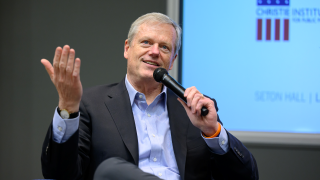Sports Poll, Professor Dan Ladik, Featured in Wall Street Journal
Thursday, January 4, 2024
 The Seton Hall Sports Poll and Associate Professor of Marketing Daniel Ladik, the poll’s chief methodologist, were featured in a Wall Street Journal article entitled "College Sports Generate Billions. Coaches Say More of It Should Go to Players."
The Seton Hall Sports Poll and Associate Professor of Marketing Daniel Ladik, the poll’s chief methodologist, were featured in a Wall Street Journal article entitled "College Sports Generate Billions. Coaches Say More of It Should Go to Players."
The article, which was published coinciding with college football’s national championship playoffs, looked at the changing landscape of college athletics and the call from a number of prominent coaches for student-athlete pay.
The article notes that
The NCAA has historically limited college athletes’ compensation to tuition, room, board and, in the wake of a 2021 Supreme Court decision, small grants. Even with that modest augmentation, the NCAA rules—set against schools’ brimming coffers—have created a divide.
And that
The gap between what colleges pay coaches and what they allocate in athlete funding provides a dramatic backdrop to the rising pressure for college athletes to be paid, and specifically out of the billions of dollars generated by their sports. A wave of lawsuits is also contributing to the push, with various cases working their way through courts around the country. Any one of them could result in a decision that forces pay for players.
The Seton Hall Sports Poll has gauged the public pulse on the issue of student-athlete pay in its various forms since its inception in 2006. The Wall Street Journal contacted the Poll for access to its research, data and findings, which clearly showed a change in public perception on this issue over time.
Having noted the change in position by college coaches and courts on the issue of student-athlete pay, The Wall Street Journal writes:
Public opinion is also moving toward athlete pay. Seton Hall has been tracking sentiment on the issue since 2006. The wording of the question has changed slightly over time, but the first-time respondents were asked if they thought college athletes should be paid a salary, a full 83% said no. That no had fallen to 55% in 2015.
By 2021, 49% of respondents said yes to financial compensation for athletes in revenue-producing sports, "such as basketball and football" and in 2023, that figure had reached 55% for respondents reflective of the general U.S. population. Among self-identified sports fans, 62% said yes.
"It would be reasonable to believe that the astronomical coaching salaries coupled with TV and advertising revenue has impacted the public’s perception of college athletics," said Daniel Ladik, associate professor of marketing at Seton Hall, and since 2020, the methodologist for the poll.
"It has become more and more difficult to maintain that cherished myth that college sports are only played for the love of the game. It’s a multibillion-dollar industry, and the only ones not getting paid are the athletes."
On Nov. 27, after Michigan beat Ohio State, Harbaugh renewed his call for sharing revenues with athletes. Harbaugh recounted to reporters the enormous promotional build-up for the game, which drew 19 million TV viewers—the most for a regular-season contest since 2011.
"Who can be against the players being compensated for what they do?" he said.
Forthcoming inquiries from the Seton Hall Sports Poll will continue to seek answers to Coach Harbaugh’s question.
The Wall Street Journal article is available at "College Sports Generate Billions. Coaches Say More of It Should Go to Players."
Categories: Athletics, Business






